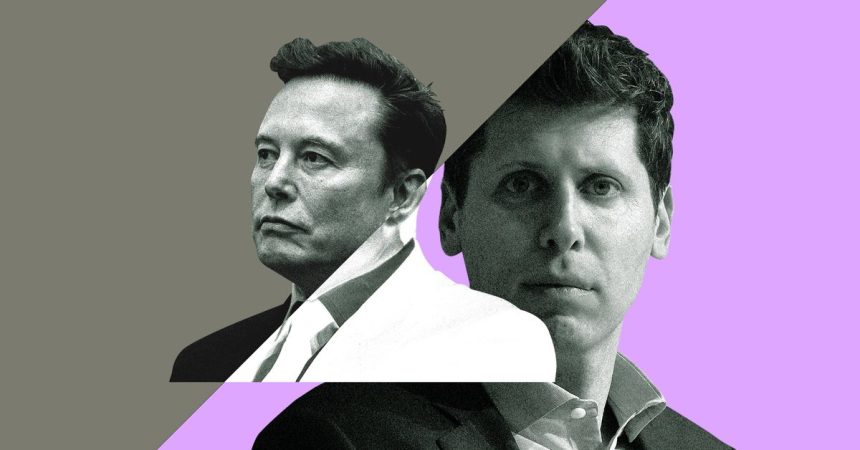The escalating legal battle between Elon Musk and OpenAI has taken a new turn with the release of a detailed blog post by OpenAI, directly addressing Musk’s allegations and offering a counter-narrative supported by text message exchanges between key figures involved in the organization’s early days. OpenAI’s central argument is that Musk’s lawsuit, accusing the company of abandoning its non-profit mission for profit-driven motives, is a smokescreen for his own failed attempts to seize control of the company and steer it towards his own vision. The blog post emphasizes OpenAI’s commitment to its mission of ensuring artificial general intelligence (AGI) benefits all humanity, contrasting it with what they portray as Musk’s desire for personal control and dominance in the AI field.
The disclosed text messages offer a glimpse into the internal discussions and power dynamics within OpenAI during its formative years. They reveal Musk’s evolving perspective on the organization’s structure, initially supporting the non-profit model but later suggesting a shift towards a for-profit approach incorporating hardware development and potentially government collaboration. These messages also highlight Musk’s ambition to assume the CEO position and gain majority control, even proposing that OpenAI be absorbed into Tesla, ostensibly as a means to secure the substantial funding he believed necessary for advanced AI research. OpenAI contends that these proposals were met with resistance from co-founders Greg Brockman and Ilya Sutskever, who expressed concerns about a potential power struggle under Musk’s leadership. The rejection of Musk’s proposals ultimately led to his resignation from the company.
OpenAI’s blog post paints a picture of Musk encouraging the team, even after his departure, to pursue aggressive fundraising strategies, while simultaneously indicating his intention to pursue advanced AI research at Tesla, claiming it was the only entity capable of securing the necessary financial resources. This narrative suggests that Musk’s current lawsuit is rooted in his frustration at OpenAI’s success and its subsequent high valuation, which he perceived as a “bait and switch” considering his initial investments. The released text messages document Musk’s expression of “disturbance” over OpenAI’s $20 billion valuation, claiming he provided the majority of early funding. OpenAI positions this reaction as a precursor to Musk’s decision to establish xAI, a direct competitor to OpenAI, further underscoring the personal and competitive dimensions of the ongoing legal dispute.
OpenAI’s strategic release of these text messages serves as a preemptive strike against Musk’s narrative, aiming to discredit his claims of a power grab by Altman and a deviation from the company’s original mission. The blog post emphasizes Musk’s own attempts to take control of OpenAI, portraying him as someone driven by personal ambition rather than a genuine concern for the ethical development and deployment of AGI. The timing of the blog post, coinciding with the re-filing of Musk’s lawsuit in August 2024 after a brief withdrawal in June, suggests a calculated effort by OpenAI to shape public perception and gain leverage in the legal proceedings. The company explicitly calls for competition in the marketplace rather than the courtroom, implicitly criticizing Musk’s legal tactics and urging him to focus on building his own AI ventures instead of attempting to dismantle OpenAI through litigation.
The core of the dispute revolves around the fundamental question of control and direction in the development of AGI. Musk’s lawsuit, as presented by OpenAI, reflects his belief that he should have maintained a dominant role in shaping OpenAI’s trajectory, while OpenAI asserts its right to pursue its own independent path, guided by its stated mission. The text messages provide context and insight into the evolution of this power struggle, revealing the underlying tensions and conflicting visions that ultimately led to Musk’s departure and the subsequent legal battle. The public release of these private communications serves as a strategic move by OpenAI to defend its position and counter Musk’s allegations, effectively turning his own words against him.
This legal battle is not merely a personal feud between Musk and OpenAI; it represents a larger debate about the future of AI and the balance between innovation, ethical considerations, and commercial interests. The outcome of this lawsuit could have significant implications for the direction of AI research and development, potentially influencing regulations and shaping the landscape of the AI industry as a whole. The clash between Musk and OpenAI underscores the complex challenges and ethical dilemmas inherent in the pursuit of AGI, highlighting the need for careful consideration of the potential consequences of this transformative technology.



